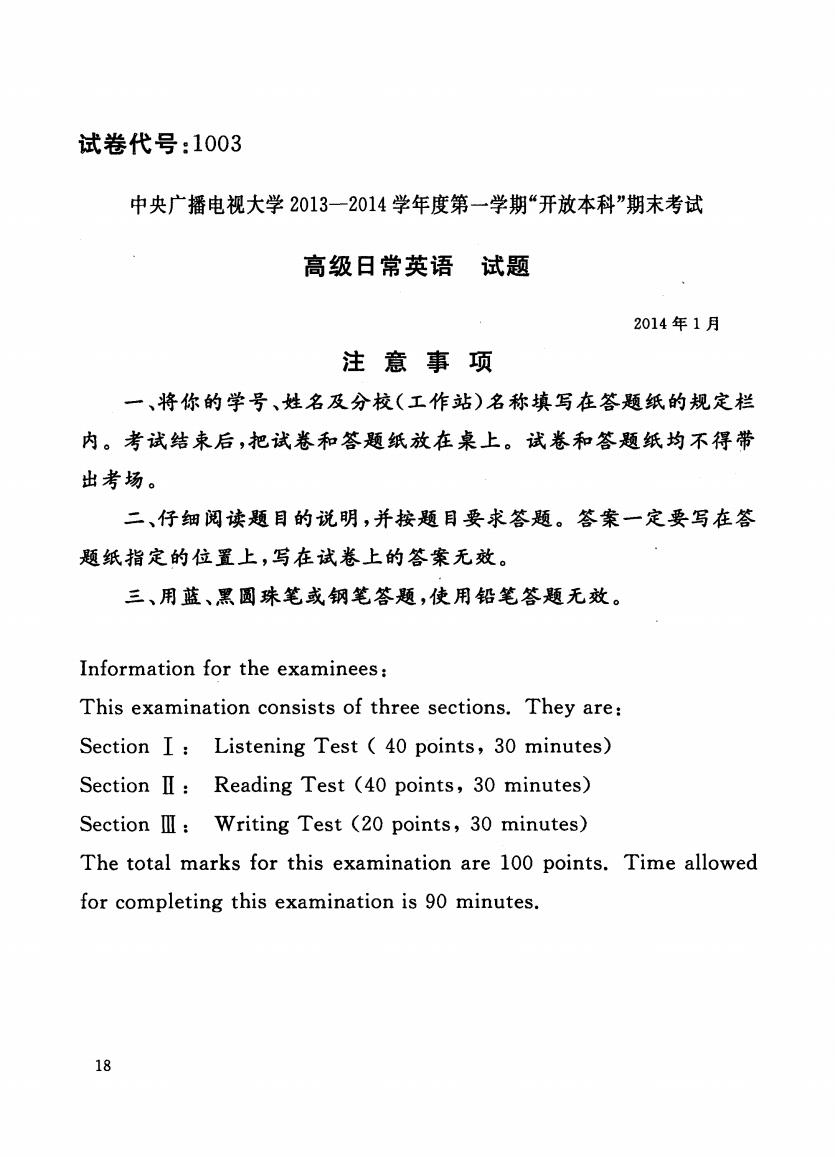
试卷代号:1003 中央广播电视大学2013一2014学年度第一学期“开放本科”期末考试 高级日常英语 试题 2014年1月 注意事项 一、将你的学号、姓名及分校(工作站)名称填写在答题纸的规定栏 内。考试结束后,把试卷和答题纸放在桌上。试卷和答题纸均不得带 出考场。 二、仔细阅读题目的说明,并按题目要求答题。答案一定要写在答 题纸指定的位置上,写在试卷上的答案无效。 三、用蓝、黑圆珠笔或钢笔答题,使用铅笔答题无效。 Information for the examinees: This examination consists of three sections.They are: Section I:Listening Test (40 points,30 minutes) Section II:Reading Test (40 points,30 minutes) Section IlI:Writing Test (20 points,30 minutes) The total marks for this examination are 100 points.Time allowed for completing this examination is 90 minutes. 18
试卷代号 0 0 中央广播电视大学 4学年度第一学期"开放本科"期未考试 高级日常英语试题 2014 年1 注意事项 一、将你的学号、姓名及分校(工作站)名称填写在答题纸的规定栏 内。考试结束后,把试卷和答题纸放在桌上。试卷和答题纸均不得带 出考场。 二、仔细阅读题目的说明,并按题目要求答题。答案一定要写在答 题纸指定的位置上,写在试卷上的答案元效。 三、用蓝、黑圆珠笔或钢笔答题,使用铅笔答题无效。 Information for the examinees: This examination consists of three sections. They are: Section I: Listening Test ( 40 points, 30 minutes) Section n: Reading Test (40 points, 30 minutes) Section Ill: Writing Test (20 points, 30 minutes) The total marks for this examination are 100 points. Time allowed for completing this examination is 90 minutes. 18
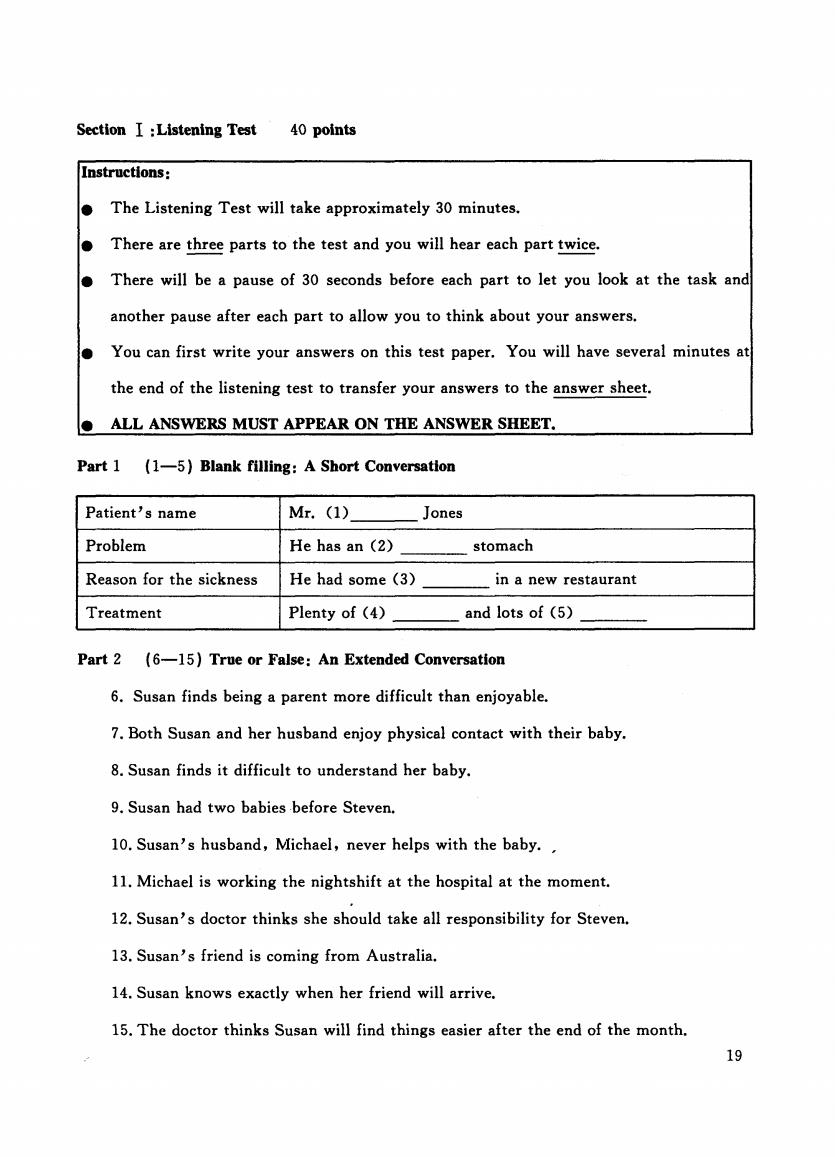
Section I:Listening Test 40 points Instructions: ● The Listening Test will take approximately 30 minutes. There are three parts to the test and you will hear each part twice. There will be a pause of 30 seconds before each part to let you look at the task and another pause after each part to allow you to think about your answers. ● You can first write your answers on this test paper.You will have several minutes at the end of the listening test to transfer your answers to the answer sheet. ALL ANSWERS MUST APPEAR ON THE ANSWER SHEET. Part 1 (1-5)Blank filling:A Short Conversation Patient's name Mr.(1) Jones Problem He has an (2) stomach Reason for the sickness He had some (3) in a new restaurant Treatment Plenty of(4) and lots of (5) Part 2 (6-15)True or False:An Extended Conversation 6.Susan finds being a parent more difficult than enjoyable. 7.Both Susan and her husband enjoy physical contact with their baby. 8.Susan finds it difficult to understand her baby. 9.Susan had two babies before Steven. 10.Susan's husband,Michael,never helps with the baby. 11.Michael is working the nightshift at the hospital at the moment. 12.Susan's doctor thinks she should take all responsibility for Steven. 13.Susan's friend is coming from Australia. 14.Susan knows exactly when her friend will arrive. 15.The doctor thinks Susan will find things easier after the end of the month. 19
Sedion I :Listening TI臼t 40 points Instructions: • The Listening Test will take approximately 30 minutes. • There are three parts to the test and you will hear each part twice. • There will be a pause of 30 seconds before each part to let you look at the task and another pause after each part to allow you to think about your answers. • You can first write your answers on this test paper. You will have several minutes at the end of the listening test to transfer your answers to the answer sheet. • ALL ANSWERS MUST APPEAR ON THE ANSWER SHEET. Part 1 (1-5) Blank filling: A Short Conversation Patient's name Mr. (1) Jones Problem He has an (2) stomach Reason for the sickness He had some (3) In a new restaurant Treatment Plenty of (4) and lots of (5) Part 2 (6-15) True or False: An Extended Conversation 6. Susan finds being a parent more difficult than enjoyable. 7. Both Susan and her husband enjoy physical contact with their baby. 8. Susan finds it difficult to understand her baby. 9. Susan had two babies ·before Steven. 10. Susan's husband , Michael , never helps with the baby. 11. Michael is working the nightshift at the hospital at the moment. 12. Susan's doctor thinks she should take all responsibility for Steven. 13. Susan's friend is coming from Australia. 14. Susan knows exactly when her friend will arrive. 15. The doctor thinks Susan will find things easier after the end of the month. 19
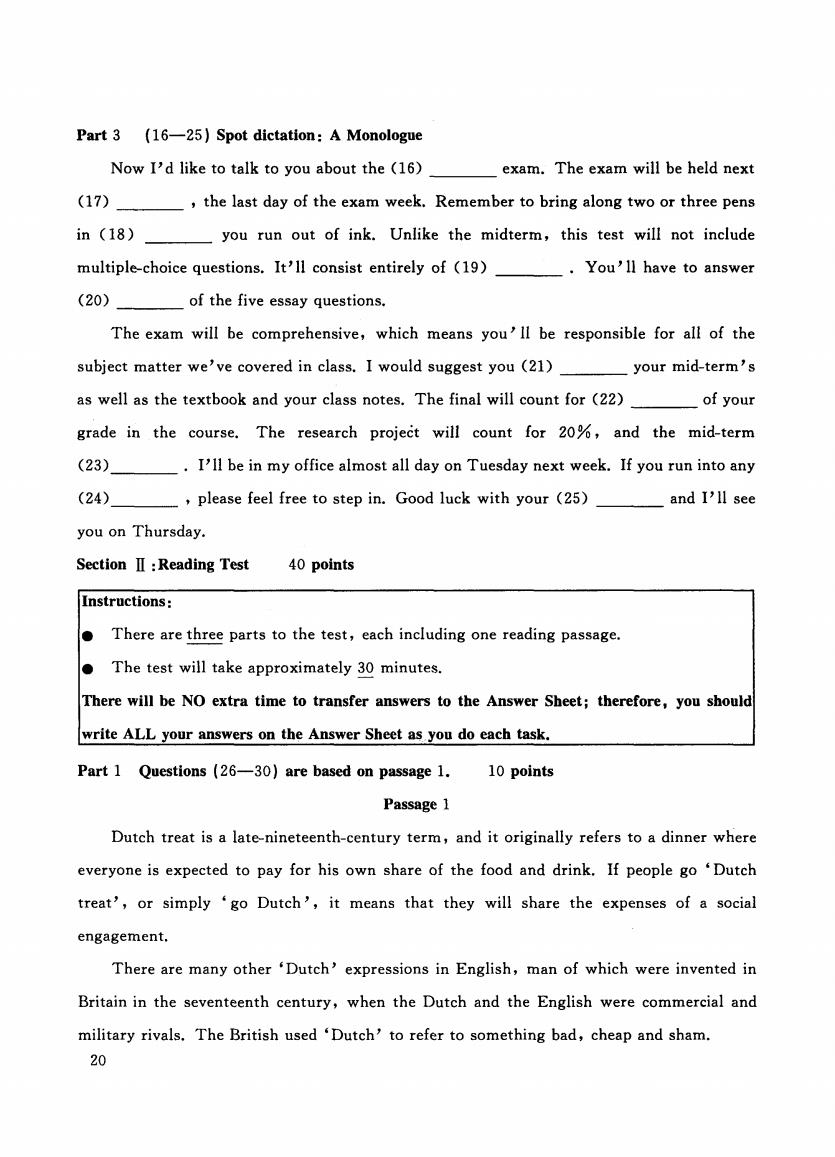
Part 3 (16-25)Spot dictation:A Monologue Now I'd like to talk to you about the (16) exam.The exam will be held next (17) the last day of the exam week.Remember to bring along two or three pens in(18) you run out of ink.Unlike the midterm,this test will not include multiple-choice questions.It'll consist entirely of (19).You'll have to answer (20) of the five essay questions. The exam will be comprehensive,which means you'll be responsible for all of the subject matter we've covered in class.I would suggest you (21) your mid-term's as well as the textbook and your class notes.The final will count for (22) of your grade in the course.The research project will count for 20%,and the mid-term (23) I'll be in my office almost all day on Tuesday next week.If you run into any (24) please feel free to step in.Good luck with your (25) and I'll see you on Thursday. SectionⅡ:Reading Test 40 points Instructions: ● There are three parts to the test,each including one reading passage. The test will take approximately 30 minutes. There will be NO extra time to transfer answers to the Answer Sheet;therefore,you should write ALL your answers on the Answer Sheet as you do each task. Part 1 Questions (26-30)are based on passage 1.10 points Passage 1 Dutch treat is a late-nineteenth-century term,and it originally refers to a dinner where everyone is expected to pay for his own share of the food and drink.If people go 'Dutch treat',or simply 'go Dutch',it means that they will share the expenses of a social engagement. There are many other'Dutch'expressions in English,man of which were invented in Britain in the seventeenth century,when the Dutch and the English were commercial and military rivals.The British used 'Dutch'to refer to something bad,cheap and sham. 20
Part 3 (16-25) Spot dictation: A Monologue Now I'd like to talk to you about the (6) exam. The exam will be held next (7) , the last day of the exam week. Remember to bring along two or three pens in (I8 ) you run out of ink. Unlike the midterm, this test will not include multiple-choice questions. It' 11 consist entirely of (19) You' 11 have to answer - ongu -- ‘ .. - v eguguay quegu .1 O 6E E nLAU The exam will be comprehensive , which means you' 11 be responsible for all of the subject matter we' ve covered in class. I would suggest you (2 1) 一一一一一 your mid-term's as well as the textbook and your class notes. The final will count for (22) 一一一 your grade in the course. The research project will count for 20% , and the mid-term (23) . I' 11 be in my office almost all day on Tuesday next week. If you run into any (24) , please feel free to step in. Good luck with your (25) and I' 11 see you on Thursday. Section II :Reading Test 40 points Instructions: • There are three parts to the test , each including one reading passage. • The test will take approximately 30 minutes. There will be NO extra time to transfer answers to the Answer Sheet; therefore , you should write ALL your answers on the Answer Sheet asJyou do each task. Part 1 Questions (26-30) are based on passage 1. Passage 1 10 points Dutch treat is a late-nineteenth-century term , and it originally refers to a dinner where everyone is expected to pay for his own share of the food and drink. If people go ‘ Dutch treat' , or simply ‘ go Dutch' , it means that they will share the expenses of a social engagement. There are many other 'Dutch' expressions in English , man of which were invented in Britain in the seventeenth century , when the Dutch and the English were commercial and military rivals. The British used ‘ Dut ch ' to refer to something bad , cheap and sham. 20
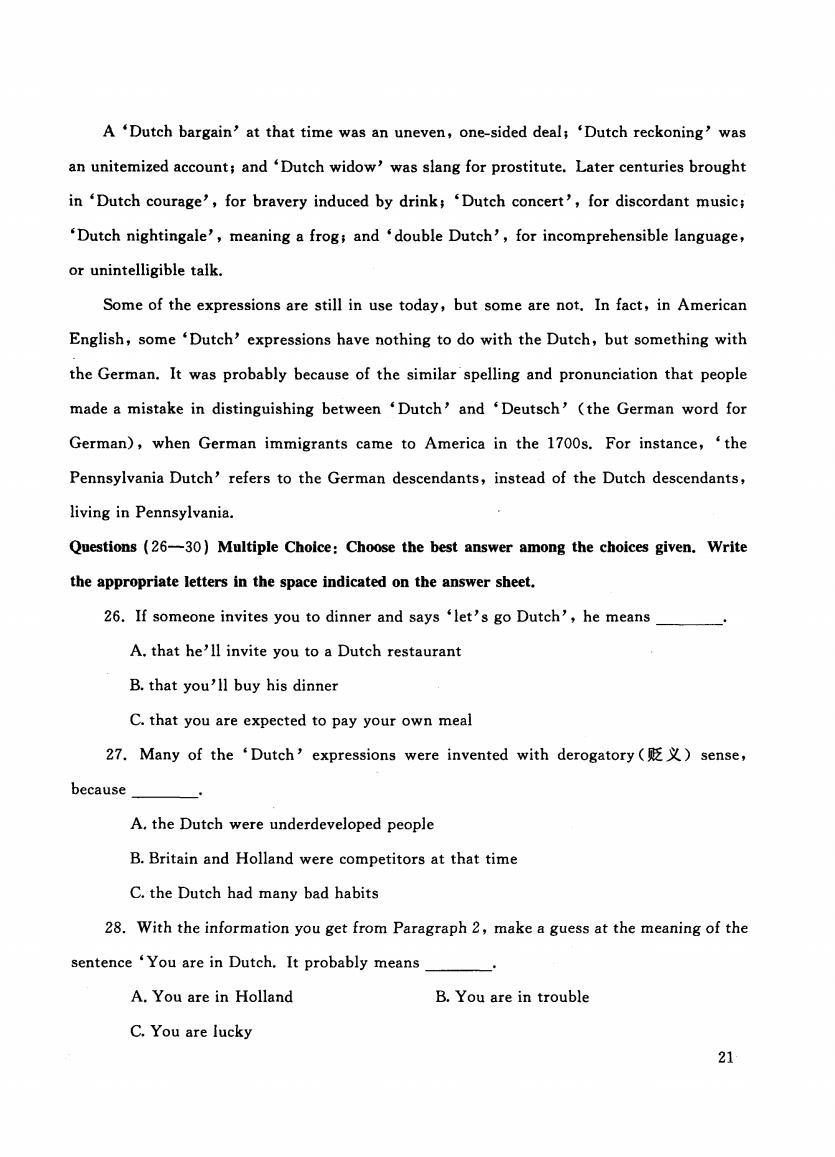
A 'Dutch bargain'at that time was an uneven,one-sided deal;'Dutch reckoning'was an unitemized account;and 'Dutch widow'was slang for prostitute.Later centuries brought in 'Dutch courage',for bravery induced by drink;'Dutch concert',for discordant music; 'Dutch nightingale',meaning a frog;and'double Dutch',for incomprehensible language, or unintelligible talk. Some of the expressions are still in use today,but some are not.In fact,in American English,some 'Dutch'expressions have nothing to do with the Dutch,but something with the German.It was probably because of the similar spelling and pronunciation that people made a mistake in distinguishing between 'Dutch'and 'Deutsch'(the German word for German),when German immigrants came to America in the 1700s.For instance,the Pennsylvania Dutch'refers to the German descendants,instead of the Dutch descendants, living in Pennsylvania. Questions(26-30)Multiple Choice:Choose the best answer among the choices given.Write the appropriate letters in the space indicated on the answer sheet. 26.If someone invites you to dinner and says 'let's go Dutch',he means A.that he'll invite you to a Dutch restaurant B.that you'll buy his dinner C.that you are expected to pay your own meal 27.Many of the‘Dutch’expressions were invented with derogatory(贬义)sense, because A.the Dutch were underdeveloped people B.Britain and Holland were competitors at that time C.the Dutch had many bad habits 28.With the information you get from Paragraph 2,make a guess at the meaning of the sentence 'You are in Dutch.It probably means A.You are in Holland B.You are in trouble C.You are lucky 21
A ‘Dutch bargain' at that time was an uneven , one-sided deal; ‘Dutch reckoning' was an unitemized account; and ‘ Dutch widow' was slang for prostitute. Later centuries brought in ‘ Dutch courage' , for bravery induced by drink; ‘Dutch concert' , for discordant music; ‘ Dutch nightingale' , meaning a frog; and ‘ double Dutch' , for incomprehensible language , or unintelligible talk. Some of the expressions are still in use today , but some are not. In fact , in American English , some ‘ Dutch ' expressions have nothing to do with the Dutch , but something with the German. It was probably because of the similar·spelling and pronunciation that people made a mistake in distinguishing between ‘ Dutch ' and ‘ Deut sch ' (the German word for German) , when German immigrants came to America in the 1700s. For instance , ‘the Pennsylvania Dutch' refers to the German descendants, instead of the Dutch descendants, living in Pennsylvania. Questions (26-30) Multiple Choice: Chω,se the best answer among the choic四given. Write the appropriate letters in the space indicated on the answer sheet. 26. If someone invites you to dinner and says ‘let's go Dutch' , he means A. that he' 11 invite you to a Dutch restaurant B. that you' 11 buy his dinner C. that you are expected to pay your own meal 27. Many of the ‘ Dutch ' expressions were invented with derogatory (贬义) sense , because A. the Dutch were underdeveloped people B. Britain and Holland were competitors at that time C. the Dutch had many bad habits 28. With the information you get from Paragraph 2 , make a guess at the meaning of the sentence ‘ You are in Dutch. It probably means A. You are in Holland C. You are lucky B. You are in trouble 21
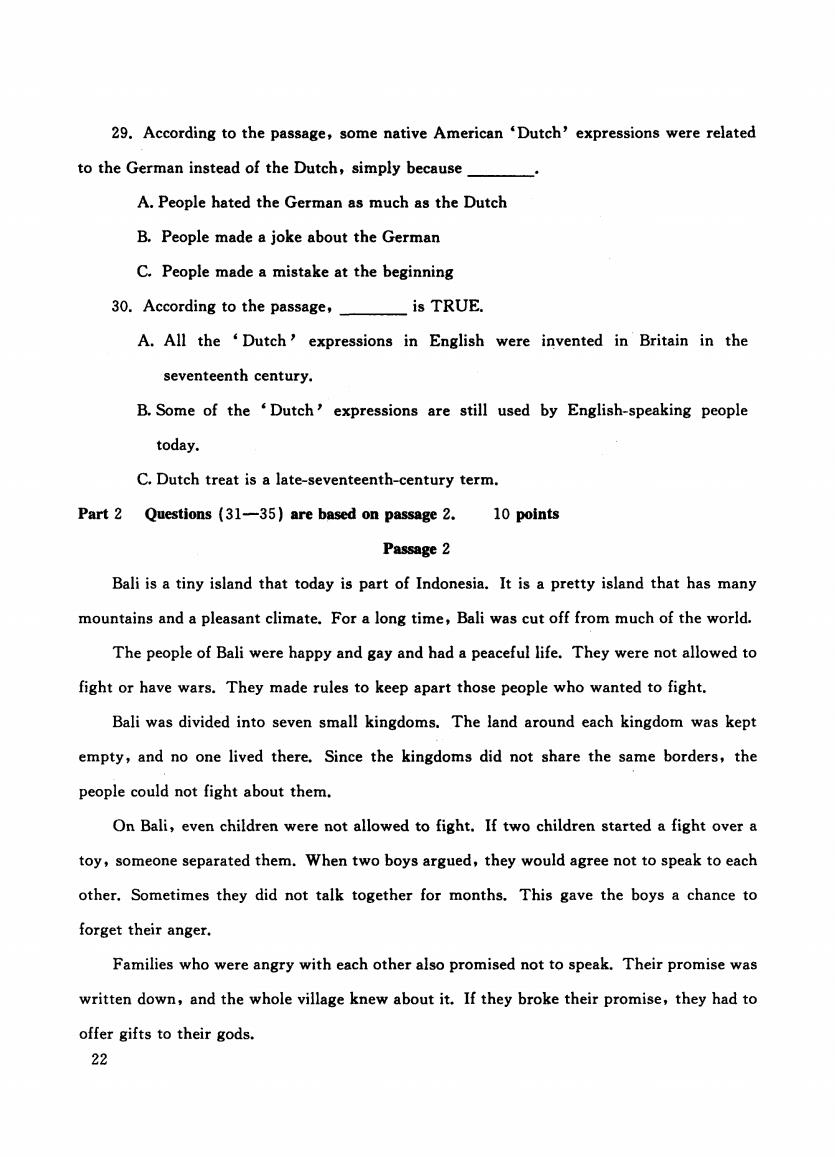
29.According to the passage,some native American 'Dutch'expressions were related to the German instead of the Dutch,simply because A.People hated the German as much as the Dutch B.People made a joke about the German C.People made a mistake at the beginning 30.According to the passage,is TRUE. A.All the Dutch'expressions in English were invented in Britain in the seventeenth century. B.Some of the Dutch'expressions are still used by English-speaking people today. C.Dutch treat is a late-seventeenth-century term. Part 2 Questions (31-35)are based on passage 2.10 points Passage 2 Bali is a tiny island that today is part of Indonesia.It is a pretty island that has many mountains and a pleasant climate.For a long time,Bali was cut off from much of the world. The people of Bali were happy and gay and had a peaceful life.They were not allowed to fight or have wars.They made rules to keep apart those people who wanted to fight. Bali was divided into seven small kingdoms.The land around each kingdom was kept empty,and no one lived there.Since the kingdoms did not share the same borders,the people could not fight about them. On Bali,even children were not allowed to fight.If two children started a fight over a toy,someone separated them.When two boys argued,they would agree not to speak to each other.Sometimes they did not talk together for months.This gave the boys a chance to forget their anger. Families who were angry with each other also promised not to speak.Their promise was written down,and the whole village knew about it.If they broke their promise,they had to offer gifts to their gods. 22
29. According to the passage, some native American ‘ Dutch ' expressions were related to the German instead of the Dutch, simply because A. People hated the German as much as the Dutch B. People made a joke about the German c. People made a mistake at the beginning 30. According to the passage, is TRUE. A. All the ‘ Dutch ' expressions in English were invented in Britain in the seventeenth century. B. Some of the ‘ Dutch ' expressions are still used by English-speaking people today. c.Dutch treat is a late-seventeenth-century term. Part 2 Qu臼lions (31 一35) are ba黯don 幅ge 2. 2 10 points Bali is a tiny island that today is part of Indonesia. It is a pretty island that has many mountains and a pleasant climate. For a long time , Bali was cut off from much of the world. The people of Bali were happy and gay and had a peacefullife. They were not allowed to fight or have wars. They made rules to keep apart those people who wanted to fight. Bali was divided into seven small kingdoms. The land around each kingdom was kept empty, and no one lived there. Since the kingdoms did not share the same borders, the people could not fight about them. On Bali, even children were not allowed to fight. If two children started a fight over a toy , someone separated them. When two boys argued , they would agree not to speak to each other. Sometimes they did not talk together for months. This gave the boys a chance to forget their anger. Families who were angry with each other also promised not to speak. Their promise was written down , and the whole village knew about it. If they broke their promise , they had to offer gifts to their gods. 22